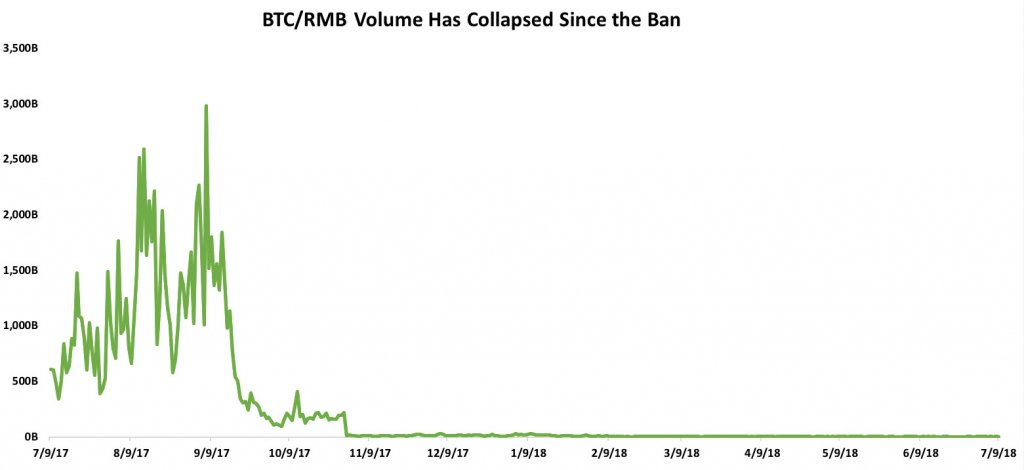Chinese Yuan Now Below 1% of Total Bitcoin Trading Volume, Down From Peak of 90%
Photo by Adi Constantin on Unsplash
In an attempt to stem growing enthusiasm for cryptocurrency trading among the Chinese public, the Chinese government has been cracking down hard on cryptocurrency traders and speculators, banning cryptocurrency exchanges and outlawing ICOs.
Zhang Yifeng, a blockchain analyst at Zhongchao Credit Card Industry Development Company said:
“The timely moves by regulators effectively fended off the impact of sharp ups and downs in virtual currency prices and led the global regulatory trend.”
The ban seems to have had the desired effect, as the Peoples Bank of China (PBoC) issued a statement through state media this week claiming the yuan now accounts for less than 1% of total Bitcoin exchange volume.

The ICO ban was instituted by the Chinese government after an investigation committee voiced concerns that ICOs were seriously disrupting the economic and financial order, and were contributing to the proliferation of Ponzi schemes and financial scams.

PBoC claimed that since the September 2017 ban, they have halted the operation of 88 different virtual currency exchanges and 85 ICO trading platforms. The PBoC spared no exchange, no matter how big. At the time of the ban, the two largest exchanges OkCoin and Huobi had travel bans placed on their executives, pending government investigations into their compliance.
In response, many Chinese citizens opted to transfer their Bitcoin to offshore exchanges in order to continue trading. In February 2018 the Chinese government cracked down once again by banning citizens from any sort of cryptocurrency related trading. The government blacklisted over 50 different exchange websites in an attempt to curb the trading activity.
Blockchain, not Bitcoin
Despite the banning of cryptocurrency trading, the Chinese government has taken steps to reassure the public that the issue is with cryptocurrencies, and not with the underlying blockchain technology. The government has made it clear they view innovation in blockchain technology – in addition to AI – as a cornerstone of their goal of capturing the future of technology.
According to a comprehensive report by research company Startup Genome, China filed the most blockchain patents in the world, three times the amount of patents the second-place United States filed.

In addition to funding innovation, the Government has publically backed several cryptocurrency projects including NEO, VeChain, and Qtum. President Xi Jinping himself has described Blockchain as a technology that was “profoundly affecting the country’s future and destiny.”
More recently, China’s Center for Industry Information Development (CCID) issued technical rankings for the top 28 public blockchains, in an attempt to engage their population in meaningful discussion.
It is clear from the approach of the Chinese government that they are interested in overseeing the nascent industry, and view blockchain and cryptocurrencies as both an opportunity and a threat.



























































